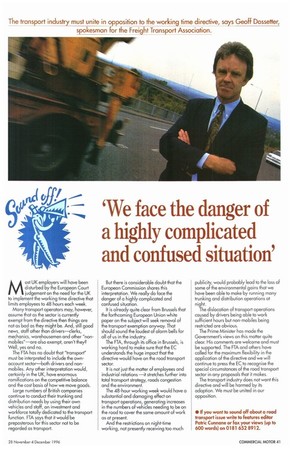'We face the danger of a highly complicated and confused situation'
Page 155

If you've noticed an error in this article please click here to report it so we can fix it.
Most UK employers will have been disturbed by the European Court judgement on the need for the UK to implement the working time directive that limits employees to 48 hours each week.
Many transport operators may, however, assume that as the sector is currently exempt from the directive then things are not as bad as they might be. And, still good news, staff other than drivers—clerks, mechanics, warehousemen and other "nonmobiles"—are also exempt, aren't they? Well, yes and no. The ETA has no doubt that "transport" must be interpreted to include the ownaccount sector—both drivers and nonmobiles. Any other interpretation would, certainly in the UK, have enormous ramifications on the competitive balance and the cost basis of how we move goods. Large numbers of British companies continue to conduct their trun king and distribution needs by using their own vehicles and staff, an investment and workforce totally dedicated to the transport Function. ETA says that it would be preposterous for this sector not to be regarded as transport. But there is considerable doubt that the European Commission shares this interpretation. We really do face the danger of a highly complicated and confused situation.
It is already quite clear from Brussels that the forthcoming European Union white paper on the subject will seek removal of the transport exemption anyway. That should sound the loudest of alarm bells for all of us in the industry. The FTA, through its office in Brussels, is working hard to make sure that the EC understands the huge impact that the directive would have on the road transport sector.
It is not just the matter of employees and industrial relations —it stretches further into total transport strategy, roads congestion and the environment.
The 48-hour working week would have a substantial and damaging effect on transport operations, generating increases in the numbers of vehicles needing to bean the road to cover the same amount of work as at present. And the restrictions on night-time working, not presently receiving too much publicity, would probably lead to the loss of some of the environmental gains that we have been able to make by running many trunking and distribution operations at night. The dislocation of transport operations caused by drivers being able to work sufficient hours but non-mobiles being restricted are obvious.
The Prime Minister has made the Government's views on this matter quite clear. His comments are welcome and must be supported. The ETA and others have called for the maximum flexibility in the application of the directive and we will continue to press the EC to recognise the special circumstances of the road transport sector in any proposals that it makes. The transport industry does not want this directive and will be harmed by its adoption. We must be united in our opposition.




















































































































































































































